
SPECIAL FEATURE
TWINS OF GENIUS -- NOT!
by
Benjamin Griffin
Mark Twain Project, University of California at Berkeley
February 2015
Writers on Mark Twain, myself included, have long been in the
habit of saying that he and George Washington Cable were billed as "Twins
of Genius" on their 1884-85 reading tour. It's received wisdom, and has
become ubiquitous; which makes it all the more regrettable that, as it turns
out, Twain and Cable were not billed as "Twins of Genius" on that
tour or any other.
With today's searchable newspaper databases, we can see how
this non-event became established as fact. The unwitting source of the error
is James B. Pond (1838-1903). Pond was the promoter of the Twain-Cable tour
- and, crucially, the promoter of another tour, at another time, by another
pair of lecturers.
As far as I can tell (and I'm happy to be corrected), our phrase
enters the historical record early in 1889, at which time it refers, not to
Twain and Cable, but to two other performers in Pond's stable: Bill Nye and
James Whitcomb Riley. Pond began in the fall of 1888 to organize a joint reading
tour by these two. Nye (1850-96) was a humorous journalist with a syndicated
newspaper column; Riley (1849-1916) a poet best known for dialect verse. The
two had already been performing together for a couple of years. In a letter
to the editor of an Augusta, Georgia, paper, Pond gave an idea of his clients'
show:
You can tell your people that Messrs. Nye and Riley will convulse the town
of Augusta November 27th (and no convulse, no pay). For pity sake try to
bear in mind that it is not a lecture. It is no more a lecture than you
are a horse. It has nothing to do with lecturing. Mr. Riley recites some
of his hoosier poems in dialect, and Mr. Nye tells some stories. You will
be delighted with them. ("Not a Lecture," Augusta Chronicle,
12 October 1888, 8.)
To look at their photos, the team of Clemens and Cable would never have suggested
"twins" of anything; but Nye and Riley did. This 1889 photograph
shows their natural resemblance; also how they accentuated it with hairstyle
and accessories.
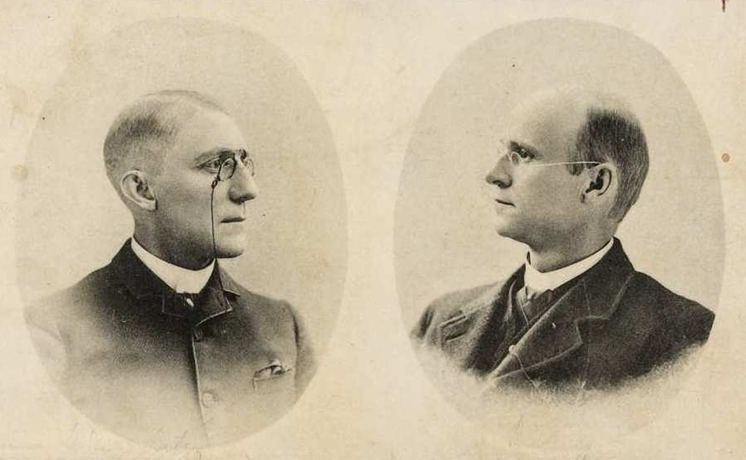
James Whitcomb Riley (left) and Bill Nye (right) - 1889
It may be that Pond's "Twins of Genius" slogan was prompted by something
Mark Twain said. Introducing Nye and Riley at Boston's Tremont Temple on 28
February 1889, he played off their mutual resemblance, speaking as if he believed
them to be Chang and Eng, the "Siamese Twins." Mark Twain's conceit
may have struck Pond as a good gimmick; yet it was clearly undesirable to
go around announcing the Siamese Twins only to present Nye and Riley to indignant
houses.
Whether or not "Twins of Genius" represents Pond's
variation on a Clemens gag, it is in the Spring of 1889 that we first find
Nye and Riley (or anybody) being promoted under that name. The earliest reference
found thus far is in the Cincinnati Enquirer of 12 March 1889, page
5.
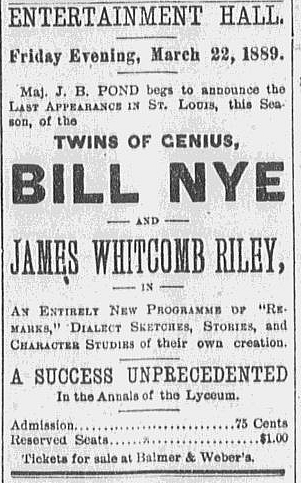
Typical ad for the "Twins of Genius" that appeared in the St.
Louis Republic of 17 March 1889, p. 5.
The name stuck. Pond wrote to Mark Twain on 28 June 1889, soliciting him
to introduce Nye and Riley on a tour taking in "fifteen or twenty"
cities:
I will go partners with you, and I will buy Nye & Riley's
time, and give an entertainment something like the one we gave in Boston.
Let it be announced that you will introduce the 'Twins of Genius.' Ostensibly
a pleasure trip for you. I will take one third of the profits, and you two
thirds.
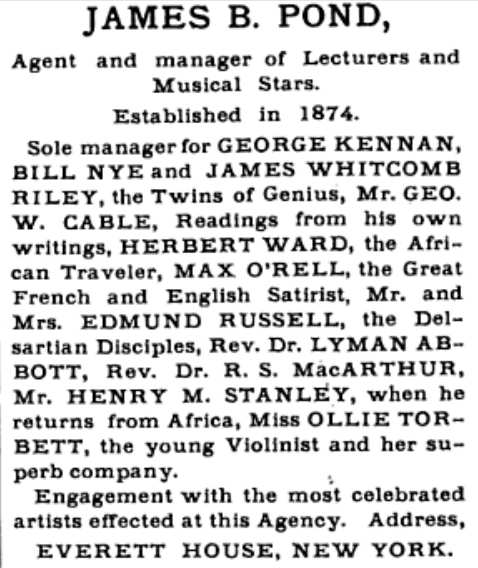
Generic ad for the Pond bureau, from a magazine called The Theatre
Mark Twain declined, but the tour went forward -- thirty weeks
with a show every night, starting in October 1889. Published sources say that
the Nye-Riley partnership, plagued by exhaustion, by Riley's alcoholism, and
by Pond, was dissolved permanently in 1890. (I cannot tell why in November
1891 Nye's newspaper column draws attention to the "bright red and blue
three sheet posters of my mammoth aggregation called 'The Twins of Genius.'
" Was he grooming a new twin -- or was he referring to himself as the
"mammoth aggregation"?)
It was in his memoir Eccentricities of Genius (1900)
that Pond wrote, wrongly, that Twain and Cable had been the "twins of
genius" (231). A few pages later, Pond twice applied the phrase, correctly,
to "the Nye-Riley combination" (246, 247). The contradiction, not
surprisingly, went unnoticed, but Pond had inadvertently planted a seed.
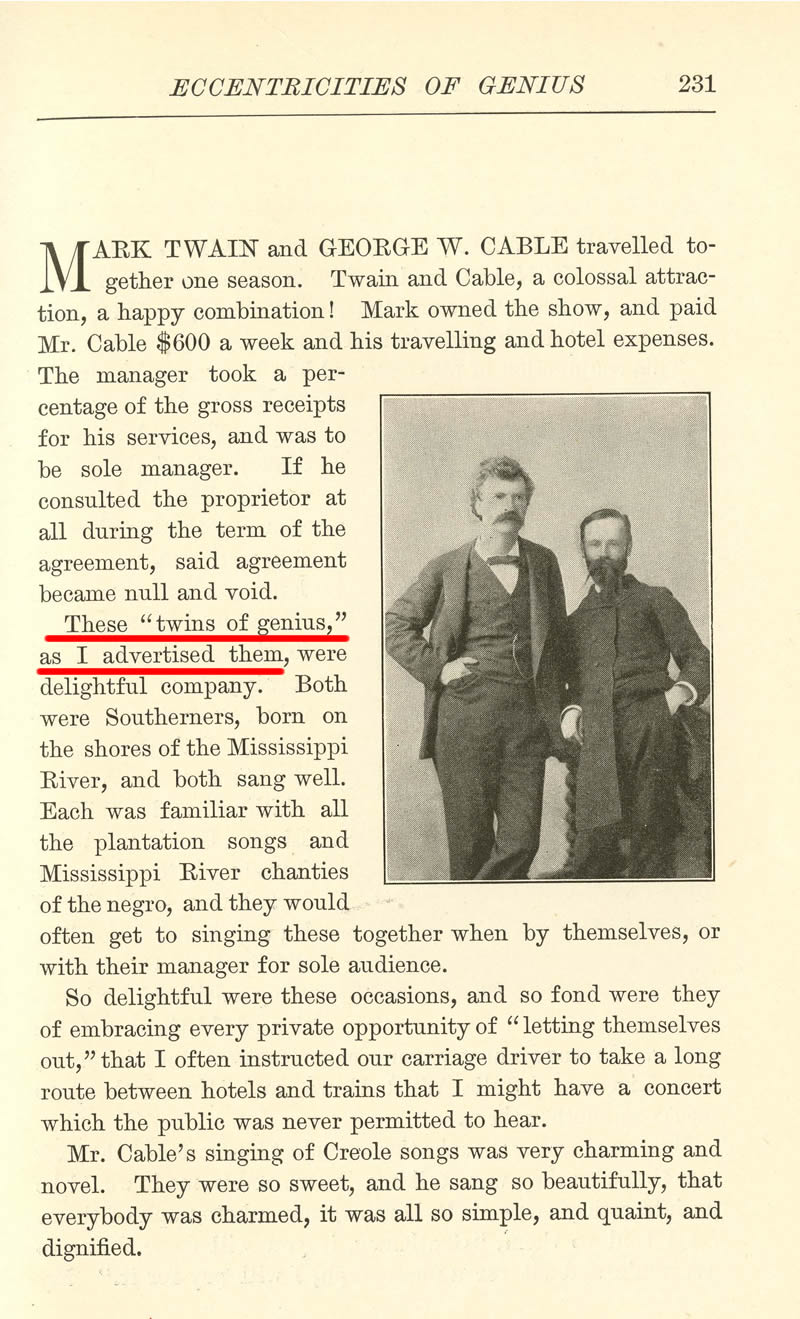
Page 231 from Pond's Eccentricities of Genius
When Pond died in 1903, obituary writers ransacked his book
for anecdotes, and gave his mistake a large circulation. A half-century later,
Guy Cardwell titled his book on Twain and Cable Twins of Genius (1953),
enshrining the mistake -- possibly forever. Cardwell gave no source for his
claim that "they were sometimes billed" under that heading (3);
unwittingly he was following, at however many removes, Pond's page 231.
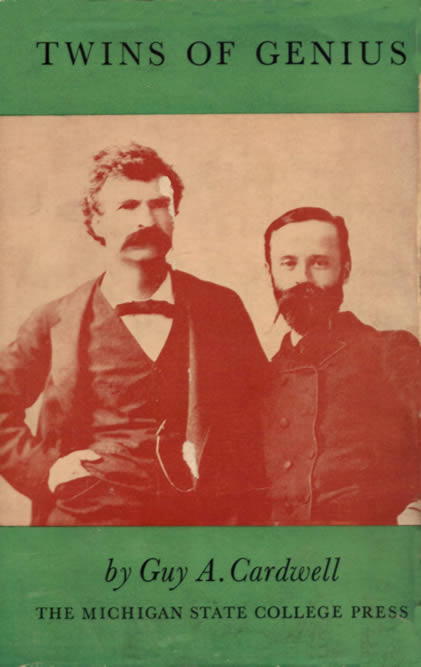
Dust jacket from Cardwell's Twins of Genius (1953)
If small errors are magnified by reduplication, then this is now a large error.
Constantly repeated, the phrase has become the insidious kind of fact that
seems not to require documenting; "common knowledge." But now it's
time we squelch "Twins of Genius" in application to Mark Twain and
return it to its right meaning.
_____
For more information on the 1884-85 tour, which includes tour
programs and other ephemera, see the University of Virginia's "Touring
with Cable and Huck."
_____
References:
Cardwell, Guy A. Twins of Genius. [East Lansing]: Michigan
State College Press, 1953.
Clemens, Samuel Langhorne (Mark Twain). "Introducing Edgar Wilson 'Bill'
Nye and James Whitcomb Riley." In Mark Twain Speaking, ed. Paul
Fatout. Iowa City: University of Iowa Press, 1976: 238-40.
Dickey, Marcus. The Maturity of James Whitcomb Riley. Indianapolis:
Bobbs-Merrill, 1922.
Nye, Edgar Wilson (Bill Nye). "Wandering Bill Nye. He Saunters through
Ohio and Pennsylvania," Rock Island (Ill.) Argus, 23 November
1891, 2.
Pond, James B. Eccentricities of Genius: Memories of Famous Men and Women
of the Platform and Stage. New York: n.p., 1900.
_____. Letter to Samuel L. Clemens, 28 June 1889, in the Mark Twain Papers,
Berkeley. Partly reprinted in Albert Bigelow Paine, Mark Twain: A Biography
(1912): II, 877.






